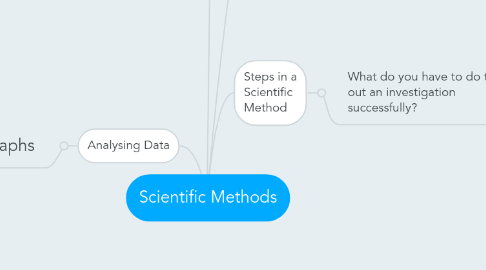
1. Recording Data
1.1. Tables
1.1.1. Parts of a Table
1.1.1.1. Title
1.1.1.1.1. Describes what data is about
1.1.1.2. Rows and Columns
1.1.1.2.1. Columns
1.1.2. If there is more than one trial, you will have to create more tables to tabulate your results
1.2. Significant Figures
1.2.1. Rules
1.2.1.1. Non-zero digits are always significant
1.2.1.2. Zeroes between significant figures are significant
1.2.1.3. All final digits after the decimal points are significant
1.2.1.4. Zeroes before the first significant digit are not significant
1.2.2. Calculations
1.2.2.1. Involving Addition/Subtraction
1.2.2.1.1. Round off to least number of decimals
1.2.2.2. Involving Multiplication/Division
1.2.2.2.1. Round off to least number of significant figures
1.2.2.3. Round up to at most 5 s.f. for intermediate working
2. Analysing Data
2.1. Graphs
2.1.1. Parts of a Line Graph
2.1.1.1. Best-fit line
2.1.1.1.1. Straight and smooth, no sketchy lines
2.1.1.2. Axes
2.1.1.2.1. Y-axis
2.1.1.2.2. X-axis
2.1.1.2.3. No need to start from 0,0
2.1.1.2.4. Markings should be consistent
2.1.1.3. Data points
2.1.1.3.1. Should be marked with a cross on the graph
2.1.1.4. Title
2.1.1.4.1. State what the graph represents clearly
3. Will either be supported or rejected by results collected from experiment
4. Steps in a Scientific Method
4.1. What do you have to do to carry out an investigation successfully?
4.1.1. Step 1
4.1.1.1. Ask a questions
4.1.2. Step 2
4.1.2.1. Formulate a hypothesis
4.1.2.1.1. Definition
4.1.2.1.2. How a hypothesis should be phrased
4.1.2.1.3. In some cases, you can refine/adjust your hypothesis if the hypothesis goes against your hypothesis.
4.1.3. Step 3
4.1.3.1. Conduct the experiment
4.1.3.1.1. Variables
4.1.3.1.2. Control Groups
4.1.3.1.3. Trials
4.1.4. Step 4
4.1.4.1. Analyse the results
4.1.5. Step 5
4.1.5.1. Make a conclusion
4.1.5.1.1. Will either support or refute your hypothesis
